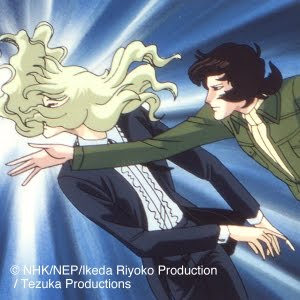cross-posted from Voices on the Square
UPDATE: Now 166 backers, $10,140 funded of $13,000; 78% funded, 22% to go with 9 days remaining.
 What in the Sam Hill is “Yuri Anime”, and what in the Sam Hill does it have to do with supporting Lesbian works?
What in the Sam Hill is “Yuri Anime”, and what in the Sam Hill does it have to do with supporting Lesbian works?
Erica Friedman at Yuricon starts out an explanation of the term “yuri” by writing:
The term Yuri (百合) is used to refer to stories that contain romantic or sexual relationships between girls or women or, sometimes more generally, stories with a lesbian character.
Yuri is not a dominant niche in Japanese manga (ie, serialized graphic novels), but it does hold a place in the market, and sometimes this shows up in anime that are based on either a yuri manga, or a manga with a yuri side-stream.
Now, manga and anime are commercial media, and so Sturgeon’s Law applies: 90% of everything is crud. Indeed, we might say that what makes somebody a “fan” of a genre is an appreciation of not just the 10% of the genre that is good, but an appreciation of some of the 90% that is crud.
Every genre has its history. From what I understand, part of the history of yuri is the “tragic lesbian”. And the “Tragic Lesbian” features strongly in “Oniisama E”, aka Dear Brother, originally created as a manga by the manga-ka (manga artists) Riyoka Ikeda in 1975, and made into an anime by Tezuka Productions in 1991.
Now, I’m not a media reviewer, and you can read Okazu non-review for a non-review or skim the Wikipedia Oniisama_e… page if you need an extended introduction to this melodrama.
However, if you reside in North America, you can, instead, stream it starting with Episode One: The Magnificant One as Nanako Misonoo, a first year student, starts her life in High School and encounters the “stars” of the school, “Hana no Sainte-Juste (Rei), Kaoru-no-kimi (Kaoru), and Miya-sama (Fukiko)” (according to the Wikipedia machine ~ I want to avoid charges of plagiarizing from Wikipedia).
Now, to see that free stream, you’ll have to sign up for a membership at the AnimeSols.com site,
That is not a bootleg stream: that is a legitimate stream under permission of the rights owner.
But, how can a more than twenty-year-old anime series that has never had an English license be available with a legitimate, free streaming?
Well, that is a story about what the AnimeSols.com site is, and what its trying to accomplish.

 A Chinese firm exporting knockoffs that threaten to undermine the sales of an American industry. It seems like a common enough story. Who I feel the most sympathy for are the poor workers toiling long hours creating the originals that are being pirated, mostly at low wages, and add the high cost of a Tokyo apartment and a surprising number still live with their pare….
A Chinese firm exporting knockoffs that threaten to undermine the sales of an American industry. It seems like a common enough story. Who I feel the most sympathy for are the poor workers toiling long hours creating the originals that are being pirated, mostly at low wages, and add the high cost of a Tokyo apartment and a surprising number still live with their pare….